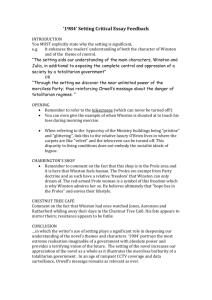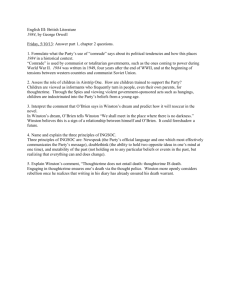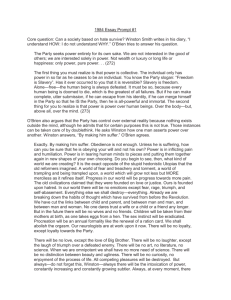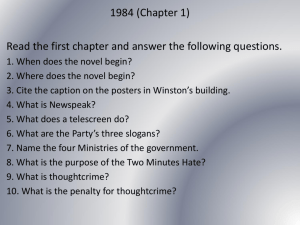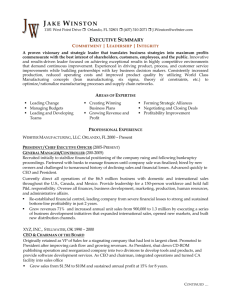Nineteen Eighty-four
advertisement
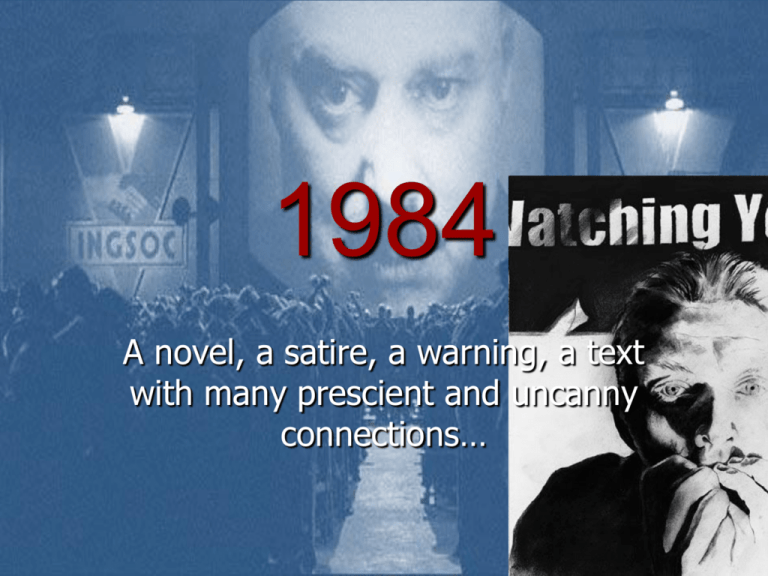
1984 A novel, a satire, a warning, a text with many prescient and uncanny connections… [During Germany’s national elections of 1932] a "summer of hate" saw daily gun battles between Nazis and Communists on the streets of Berlin. Christopher Isherwood [author of Goodbye to Berlin, considered among the most significant political novels of the 20th century and inspiring the world famous musical Cabaret] … thought there was something false and ritualistic about this street fighting, as though both parties were in it mainly for publicity purposes – “fifteen seconds, and then it was all over and dispersed,” as Isherwood remembered it. There was no doubt that both sides, extreme left and extreme right, now had an interest in breaking down public order and scaring everyone away from the centre parties. Tom Reiss, The Orientalist, Random House 2005, p.264 Winston Smith Winston Smith Everyman is an English morality play of the 15th century which achieves a beautiful, simple solemnity in treating allegorically the theme of death and the fate of the human soul—of Everyman's soul. Doublethink The keyword here is blackwhite. Like so many Newspeak words, this word has two mutually contradictory meanings. Applied to an opponent, it means the habit of impudently claiming that black is white, in contradiction of the plain facts. Applied to a Party member, it means a loyal willingness to say that black is white when Party discipline demands this. But it means also the ability to believe that black is white, and more, to know that black is white, and to forget that one has ever believed the contrary. This demands a continuous alteration of the past, made possible by the system of thought which really embraces all the rest, and which is known in Newspeak as doublethink. Doublethink is basically the power of holding two contradictory beliefs in one's mind simultaneously, and accepting both of them. – Part II, chapter IX - chapter I of Goldstein's book Newspeak “Don’t you see that the whole range of Newspeak is to narrow the range of thought? In the end we shall make thoughtcrime literally impossible because there will be no words in which to express it.” Syme, chapter 5 News peak Think of examples where world or local news has been reported or edited in biased ways (by newspapers with different political agendas, for example) Read Orwell’s essay, Politics and the English Language, written in 1946 (referred to in the latest Adelaide Independent Weekly) Characterisation Julia: a different kind of rebel to Winston? Syme: an almost obsessive intellectual? Parsons: the submissive worker who, despite his enthusiasm for Big Brother, will end up as a victim (like Boxer in Animal Farm)? Winston: hero or an anti-hero? Character studies With the class divided into four groups, each will write a study of one of the following characters: Julia; Syme; Parsons; Winston Do not merely describe and analyse them, but identify from where exactly in the book you get your ideas. The Language of the Third Reich... The German philologist Victor Klemperer made a secret study of the Nazis' perversion of the German language. Although he was sacked from Dresden University (where he was professor of French Literature) in 1935 because he was a Jew, Victor Klemperer was allowed to remain in Dresden throughout the war years because the Nazis classified his wife as an 'Aryan'. Klemperer risked their lives by keeping detailed diaries in which he made a meticulous study of Nazi rhetoric, which he codenamed LTI, standing for Lingua Tertii Imperii. Dr Leo Kretzenbacher on the German philologist Victor Klemperer, ABC Radio National, Saturday 22/03/2003 Published in 1946 in what was then the Soviet-occupied part of Germany, ‘The Language of the Third Reich’ consists of excerpts from the diary Viktor Klemperer kept during a murderously insane time as a means of keeping sane. Its immediate appeal and eminent readability after almost 60 years lies in its deeply personal character. How can a manipulated system of language poison everyday life? Central to Klemperer’s endeavour is the question: how and to what extent can immersion in a completely manipulated system of language - along with other symbolic systems - poison the everyday thinking and speaking of ordinary people? He is amazed by the spread of Nazi terminology, and by the willingness of people to believe Nazi propaganda, particularly those who are not themselves Nazis. Amongst the uneducated as well as the highly educated, … even amongst fellow Jewish victims of the Nazis, he encounters a large amount of vocabulary that he traces back to official Nazi use, plus a deep conviction, right up to the end, that Hitler is going to turn around the obviously lost war. In the afterword, Klemperer even … asks whether he himself had been immune to the generalisations of ‘the other’ that Nazi propaganda had drummed into people. Sprache, die fur dich dichtet und denkt Deprived, amongst so many other things, of any access to libraries and even to newspapers as a Jew, Klemperer starts to analyse his everyday impressions from his intimate knowledge of the rationalist tradition of the Enlightenment and European literature of the Classic and Romantic periods. His main hypothesis is derived from Friederich Schiller’s idea of ‘language that writes and thinks for you’. His material is everything he can get access to, such as scraps of newspapers he gets as wrapping paper or is given by his wife, who is also able to borrow some books from the libraries locked to him. Aufziehen ‘Aufziehen’ is a German verb with a neutral technical meaning such as ‘winding up a mechanical toy or a clock’. ‘Jemanden aufziehen’ can also mean ‘to pull someone’s leg’. Chapter 7 analyses how this verb was hijacked by the Nazis and given the completely new meaning of ‘setting up something on a grand scale’. This new meaning of the verb ‘aufziehen’ survived the Third Reich and has ever since been a seemingly harmless exaggeration for any event that is planned and performed on a grand scale. Nazi use of language survived Nazi rule. fanatisch Much more obvious in its manipulative intention is the emphasis the Nazis put on the adjective ‘fanatical’. Throughout the Nazi period, ‘fanatisch’ kept the connotation of blind irrationality it had since the Enlightenment, while being turned into a positive word. Thus to Klemperer, the ubiquitous use of ‘fanatisch’ and ‘Fanatismus’ in LTI is much more than just an element of a pompous and threatening vocabulary; it signifies the Nazis’ contempt for rationality and their idolising of pseudo-religious blind faith. Gefolgschaft ‘Gefolgschaft’ literally means ‘group of followers’. This medieval term with feudal overtones was used in the Nazi vocabulary to refer to any entourage, but more specifically to the workforce or staff of a particular employer. By exchanging contemporary industrial relations terms such as ‘Belegschaft’, ‘Arbeitnehmer’ or ‘Angestellte’ for ‘Gefolgschaft’, each and every workplace is transformed into a little Third Reich of its own, reflecting the relationship between ‘Fuhrer’ and ‘Gefolgschaft’, ‘leader and followers’, thousandfold. Dr Leo Kretzenbacher, Department of Germanic and Swedish Studies, Melbourne University. Structure The novel is divided into three parts with one appendix. In three groups, identify what the narrative purpose is for each part (e.g. an introduction – but to what?) and what the general focus of each part is. In Nineteen Eighty-Four, the story is told chronologically, apart from…when? Identify any deviations in chronological narrative for your part and explain their effect or purpose. Genre From Utopia to Dystopia While incorporating a sense of post-1945 austerity (written in 1948, the novel reflects the privations Britain suffered as a result of WWII), the setting consciously inverts many of the principles fundamental to the construction of a utopian community Genre The Utopian City Typically well-ordered, harmonious and perfect in all parts, reflecting the sociopolitical ideals of the utopian writer The City of 1984 A decaying, bomb-shocked London of ruined skull-like houses – the constant watchful regard of power isolates and separates rather than unites its people: “In our world there will be no emotions except fear, rage, triumph and self-abasement” (p.279) Genre Utopian Transparency All motives and functions work transparently under the all-pervading light of rationality, honesty and truth Oceania’s darkness Mirrors do not reflect; all glass is opaque; the telescreen is really the eye of a spy Genre The Newspeak appendix A parody of pure language, transparent in all its parts, it rather mutilates and homogenizes to prevent the possibility of free thought O’Brien as utopian architect A moralist, censor and pedagogue who wants to reform humanity through Winston Smith – the ‘last man’ of a generation becoming extinct – by uprooting memory and individual identity Point of View The book is written in the third person but stays with Winston’s point of view Does this affect one’s vision of what happens? of the other characters? Winston at first thinks that Julia is a member of the Thought Police, while he trusts O’Brien. How does this affect the reader? What does this show us about different types of narrator and the effects of changing point of view? Could one have told this story from O’Brien’s viewpoint? Or Julia’s? Do it, choosing your own appropriate short scene. “God is power” (p.276): 1984’s metaphysical paradox If God is power, he had to create the world so as to be perceived Winston Smith’s rebellion is created by O’Brien in order for the party to reaffirm the reality of its power, by creating the consciousness of its power: “a boot stamping on a human face – for ever” cannot exist without a face 2+2=5 The only point in making Winston believe that two and two equals five is to break him: Denying a belief for no reason (to act without reason) is a first step towards losing a sense of self – it makes you irrational in the precise sense of being unable to justify yourself to yourself. Room 101 Why are rats Winston's deepest fear? What is the psychological source of this fear? 101 In his selfish and uncontrollable hunger as a child, Winston denied his mother and tore himself away from the primary bond of belonging, loyalty and love. In his uncontrollable fear of the rats, Winston reenacts that first act of betrayal: he offers up the body of the only person he loves, as a surrogate for his own. When he screams, "Do it to Julia" offering her as a human sacrifice to the hungry rats - he symbolically devours the one he loves. 101 In Room 101 he can no longer stay "in front of" the wall of darkness: he is forced to get over to "the other side" (p.297). And as the walls of the private self are being destroyed, he feels that he is falling "through the floor, through the walls of the building, through the earth, through the oceans, through the atmosphere, into outer space, into the gulfs between the stars - always away, away, away from the rats" (p.300) Room 101 O'Brien's experiment was successful: man is nothing but a beast who can be degraded until he is deprived of his will to become an instrument in the hands of the Party. Room 101 BUT the starved rats, just like the child Winston, were themselves the victims of the Party's brutality. Ultimately the real face behind the mask-like cage of the rats is the face of Big Brother himself - who turns his subjects into ferocious, hate-filled beings like himself, forcing them to act out the ritual of his own prime betrayal as human sacrifice. Room 101 In effect, all the citizens of Oceania are kept in their cage, systematically starved, deprived of food, love, sexual and emotional satisfaction, so that the Party may channel all their pent-up energy into the hysterical quest for new victims, leading to the equally hysterical worship of their leader. 101 But if Room 101 had always been waiting for Winston - as he had often guessed and we now know - then where is the shame and personal responsibility? Here is the novel's complex moral paradox. 101 For thirty years Winston's sense of guilt has been a burden, but it also served as a reminder that he still had a sense of personal loyalty and could feel shame. In fact, it was this mysterious sense of guilt or shame that made him start his search for the Truth in the past, the search which led ultimately to moral regeneration. 101 Significantly, once he repeats his act of betrayal, he no longer carries the burden of guilt - free of his sense of humanity and basic moral attitudes defining the private self. Once reborn, united with the collective self of Oceania, he is incapable of regret or guilt because he has no further claim to a private conscience. 101 Room 101 provides the climactic scene of the novel in which all betrayals are brought together in a series of symbolic reversals Face-to-face through zero: reduced to nothingness through fear and shame, Winston faces the rats in himself Repetition after a reversal: repeating the childhood trial, Winston reverts to another state of childhood 101 Room 101 is at the heart of the novel, wherein all betrayals are brought together in a series of continuous, repeated reversals: At the centre of the mythical (Oedipal), political (totalitarian), and pyschological drama of betrayal. 1010101010101010101010101 It is here that any victim is turned victimiser by betraying his bond of private loyalty. Paradoxically, it is precisely at this point that he will finally be trapped, 'chained' to become a true victim, willing to stay in his cage forever. Ironically, it is by adjusting to the norm of the majority that Winston has now become, finally, insane. Having joined in the collective insanity imposed on the population by Big Brother, Winston now willingly joins the other rats in their cage. Room 101 Alan Kennedy argues that 1984 is not a prophecy or a warning but a challenge to our ability to read critically Room 101 represents the enactment of the state’s power – as an absolute bondage between the state and its victim Reading against the grain of the novel, we may reject O’Brien’s version of power by questioning the claim that all reality is in the mind or available in the form of knowledge ‘The Inversion of Form: Deconstructing 1984’, in George Orwell, ed. by Graham Holderness, Bryan Loughrey and Nahem Yousaf (Basingstoke: Macmillan 1998) Room 101 Erika Gottlieb argues that room 101 reveals the psychodynamics of totalitarianism: Why Western intellectuals were susceptible to the psychosis of nationalistic leader worship Winston’s ordeal is that of Everyman – our common humanity in confrontation with the dehumanising forces of totalitarianism The mask-like rat’s cage symbolises loss of face and Winston’s guilt for denying the fundamental values of the private self Dystopian Fiction East and West: Universe of Terror and Trial. Montreal: McGillQueen's UP, 2001 Room 101 The efficiently repressive state induces in its subjects a perpetual state of guilt formed from the knowledge of betrayal – betrayal of the self, of others and ultimately of Big Brother. Room 101 In the 1930’s, U.S. psychologist, B.F. Skinner, extended the work of Ivan Pavlov on conditioned reflexes in animals, by training a laboratory rat to press a small lever protruding from one wall of his specially designed box in order to obtain a pellet of food. In 1948 he published one of his most controversial works, Walden Two, a novel on life in a utopian community modelled on his own principles of social engineering. Re-educating the self in Dystopian Fiction NINETEEN EIGHTY-FOUR &

